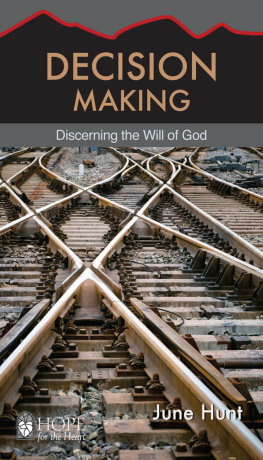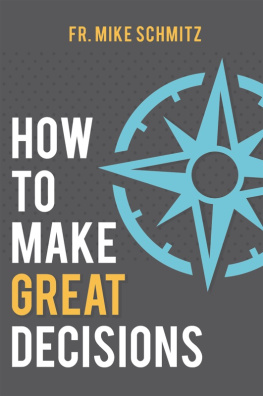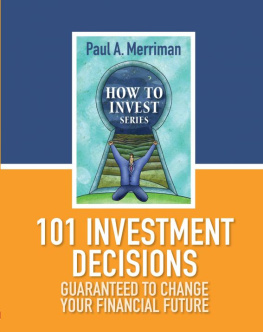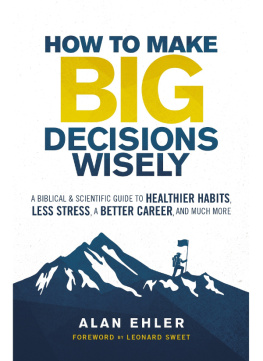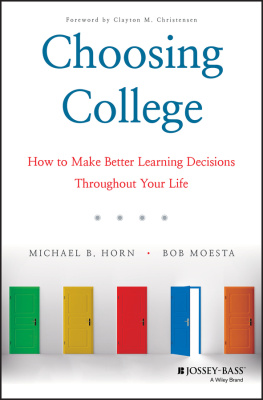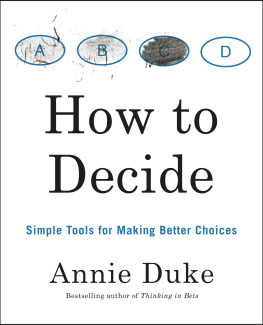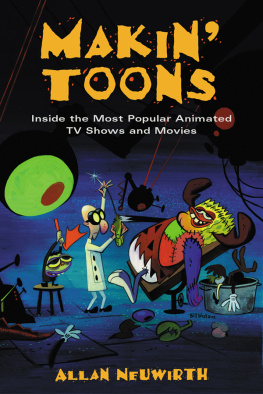WHATS
YOUR
FUTURE
WORTH?
WHATS
YOUR
FUTURE
WORTH?
USING PRESENT VALUE TO MAKE BETTER DECISIONS
Peter Neuwirth, FSA

Whats Your Future Worth?
Copyright 2015 by Peter Neuwirth
All rights reserved. No part of this publication may be reproduced, distributed, or transmitted in any form or by any means, including photocopying, recording, or other electronic or mechanical methods, without the prior written permission of the publisher, except in the case of brief quotations embodied in critical reviews and certain other noncommercial uses permitted by copyright law. For permission requests, write to the publisher, addressed Attention: Permissions Coordinator, at the address below.
|
|---|

| Berrett-Koehler Publishers, Inc.
1333 Broadway, Suite 1000
Oakland, CA 94612-1921
Tel: (510) 817-2277, Fax: (510) 817-2278
www.bkconnection.com |
Ordering information for print editions
Quantity sales. Special discounts are available on quantity purchases by corporations, associations, and others. For details, contact the Special Sales Department at the Berrett-Koehler address above.
Individual sales. Berrett-Koehler publications are available through most bookstores. They can also be ordered directly from Berrett-Koehler: Tel: (800) 929-2929; Fax: (802) 864-7626; www.bkconnection.com
Orders for college textbook/course adoption use. Please contact Berrett-Koehler: Tel: (800) 929-2929; Fax: (802) 864-7626.
Orders by U.S. trade bookstores and wholesalers. Please contact Ingram Publisher Services, Tel: (800) 509-4887; Fax: (800) 838-1149; E-mail: /Ordering for details about electronic ordering.
Berrett-Koehler and the BK logo are registered trademarks of Berrett-Koehler Publishers, Inc.
First Edition
Paperback print edition ISBN 978-1-62656-301-8
PDF e-book ISBN 978-1-62656-302-5
IDPF e-book ISBN 978-1-62656-345-2
2015-1
Cover Design: Ian Koviak/The Book Designers
Dedicated to the memory of
Robert Frohlich, 19552010
Who taught us all that
nothing is impossible to imagine
Contents
Preface
When I was a teenager, my fathera mathematician who spent most of his career working as a cryptologist for the US governmentgave me a little book written by G. H. Hardy called A Mathematicians Apology. He said he wanted me to understand the way he thought about the world. At that age, I wasnt very interested in my fathers world, particularly as he and it seemed distinctly out of step with what seemed to be happening all around us. It was the early 1970s, times were changing fast, and the musings of an old British math professor did not seem at all relevant to my life. The book stayed unread for a long time, but one day in my junior year at college, having only recently enrolled in my first math class in years (despite having gone all the way through calculus while in high school), something made me pick it up and start reading. I guess part of it may have been a growing feeling that as much as I wanted to deny it, math was in my blood and it was high time I came to grips with and understood what it meant to think like a mathematician. The message I got from the book, and later from my father when we talked, was that one doesnt choose to be a mathematician; rather, one is compelled to become one. My father said it was like having a monkey on my back and confessed that most of the time he simply couldnt help himself thinking about mathematics or seeing the world in mathematical terms. It was something he never wished for me.
It turns out that I didnt become a mathematician but instead became an actuary. Being an actuary is certainly not as obsessive or all-consuming as being a theoretical mathematician, and as actuaries we tend to be somewhat more comfortable with normal human interaction. However, being an actuary does mean looking at the world in a unique way, particularly when it comes to three elements of life that we all have to deal withtime, risk, and money. As actuaries, we are trained to balance these three elements to help manage many of the financial security programs thatthough central to our livesmost of us dont think about too often, such as insurance, pensions, Social Security, and so forth. Important as this is, I believe that the actuarial perspective can have even broader application. For many years, Ive been thinking about just what that means and how to communicate it to others.
This book is a result of that thinking and is my attempt to put into words the actuarial perspective, to share the insights that my thirty-five years as an actuary have given me on not just how to make financial decisions, but how to think about and make many other important choices that arise in life. This book will not teach you how to be an actuaryit wont even teach you how to think like an actuarybut it will give you an important tool that you can use in your own life to make better decisions.
That tool is called Present Value and even though it has a mathematical definition, you dont need any math to use it. Fundamentally, Present Value is a way to think about all the ways the future may unfold and boil down those possibilities to an apples to apples choice that can be made today. It is a framework and a process that you can use to make all kinds of decisions ranging from the mundane (e.g., whether to buy a new car or how much to contribute to your 401(k)) to the most important (e.g., when to change careers or how to make life-and-death medical decisions).
So who is this book for? Since I believe that everyone who has to make life decisions can benefit from thinking more systematically about the choices they face, in a sense, this book is for everyone, or at least everyone who wants to get better at making decisions.
The above notwithstanding, there are certain people for whom this book will be particularly valuable. For example, I think that those who advise others on financial, medical, and lifestyle choices may find learning about the actuarial perspective and Present Value very useful indeed.
Finally, because I am an actuary who will be talking honestly and directly about the profession, I expect that many, if not most, actuaries and those considering actuarial work as a profession will be interested in hearing what I have to say.
Throughout this book, I will talk about how Ive used the actuarial perspective and Present Value to make choices in my life. Ive tried to distill that process down to a set of principles and steps that you can take with you to think more systematically and clearly about your future and how it will be shaped by the choices you make.
While its not a formula or recipe to live a better life, those principles and that systematic approach to decision making has allowed me to make decisions with more awareness and a clearer understanding of the future consequences of my choices, and I truly hope it does for you as well.
Introduction
THINKING ABOUT THE FUTURE IN A SYSTEMATIC WAY
It has become a clich to say that we live in an Information Age, but the fact of the matter is that the amount of data available to us has exploded and grown almost beyond our ability to comprehend. At the same time, we as individuals are, more than ever, inundated with choices in our daily lives, and unlike the past, these choices now come associated with an overwhelming amount of information. Some of that information we seek and some is thrust upon us, but in total, rather than help us, the data often simply paralyzes us. From the mundane consumer choices we make every day to life-and-death medical decisions, we are given facts, figures, and recommendations but no
Next page

